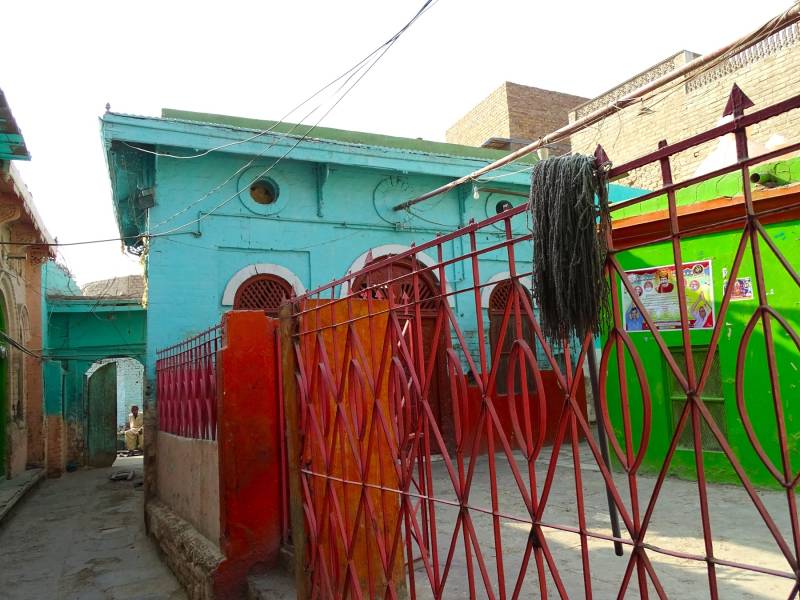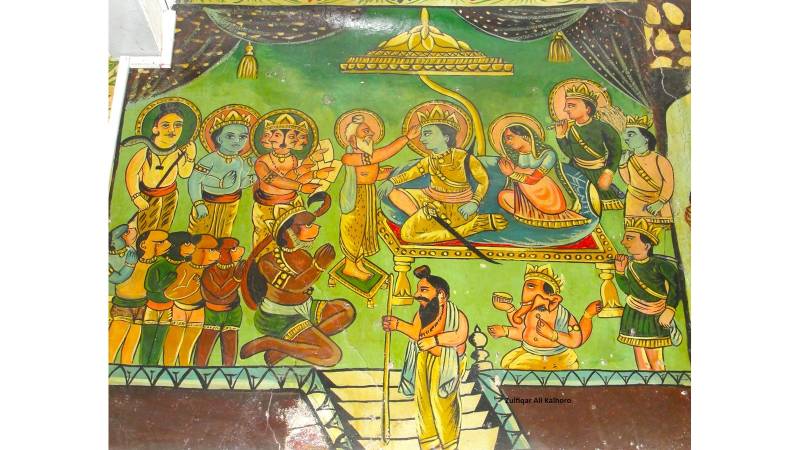
Shikarpur was once home to a large number of temples, darbars, Dharamshalas, and marhis which were noted for wall paintings. Today, a few have survived that with wall paintings that are intact. The majority of the sacred spaces have either been abandoned, disappeared, or occupied.
One popular revered site that survives is Sant Balakram Ji Marhi, which is situated near Lakhidar (Lakhi Gate) in Shikarpur City.
This Marhi is named after the Hindu mystic Sant Balakram. One learns from Munhijo Watan Munhija Mahnoon by Lok Ram Dodeja (1993) that Sant Balakram was known for his piety. He used to pray at the bank of Sindh Wah in Shikarpur. He used to spend most of his time at Mata Marhi as well. According to Dada Reva Chand, a notable of Shikarpur city, after partition, Baba Balakram mandir was also established in Ulhasnagar, India.
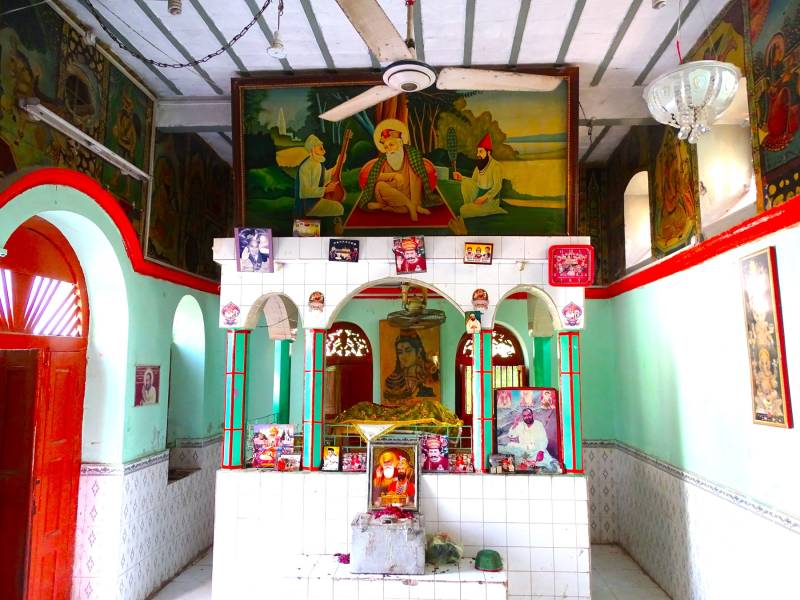
It is not known when Sant Balakram died. It is said that he died before the partition of 1947. Balakam Ji Marhi was a huge complex that included both religious and secular structures.
I was interested in wall paintings of Shikarpur, so I visited and revisited Sant Balakram Ji Marhi several times as it attracted me for two reasons, one for its paintings and the second for woodwork. This Marhi is among the few surviving structures in Shikarpur that depict impressive paintings and woodwork. The main doorway of the Balakram Ji Marhi is noted for depictions of Guru Nanak along with his two companions Bhai Bala and Bhai Mardana. This theme of Guru Nanak with Bhai Bala and Bhai Mardana was picked and used by Shikarpuri artists on wooden doors of temples, darbars, and havelis. There are still several havelis, maaris, marhis, mandirs and darbars which contain the images of Guru Nanak with Bhai Bala and Bhai Mardana, Unfortunately, the majority of wooden doors of havelis that represented Guru Nanak with his companions Bhai Bala and Bhai Mardana has been removed and sold out!
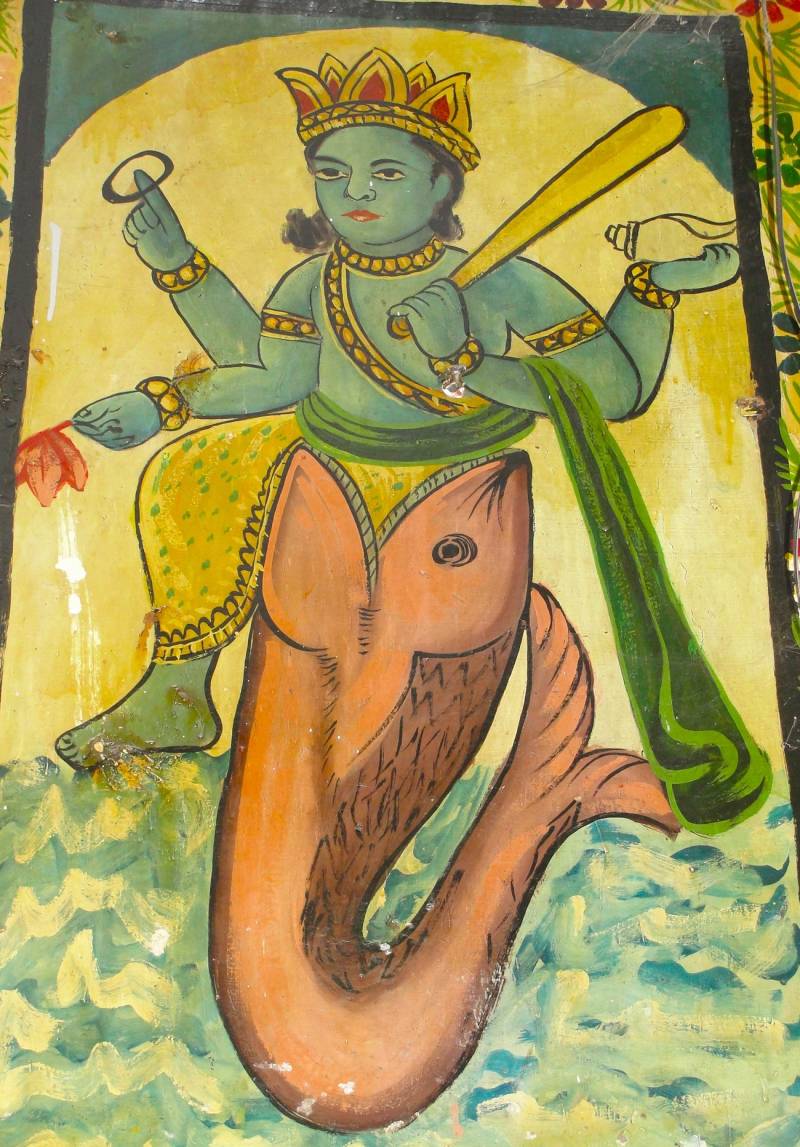
The Balakram Ji Marhi is adorned with paintings representing themes from the Hindu scriptures Ramayana, Mahabharata, Vishnu Purana, Gita Govinda etc. Apart from Hindu deities and saints, it also depicts Sikh gurus and saints.
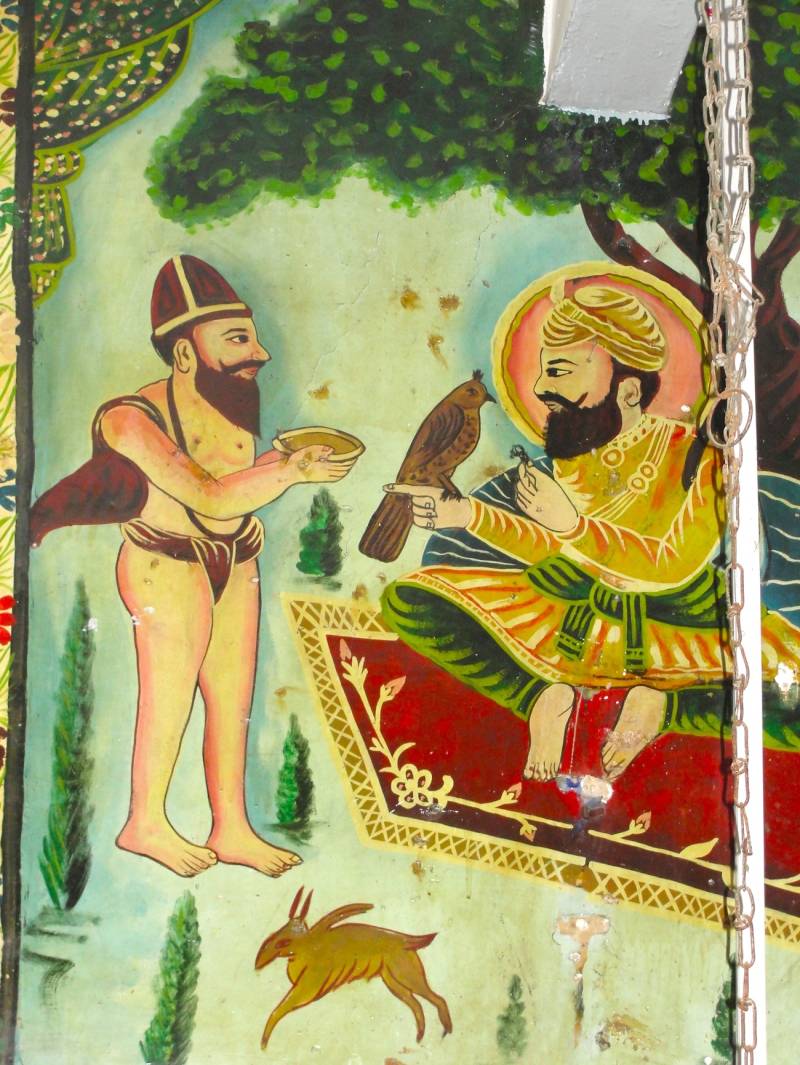
As one enters Sant Balakram Ji Marhi, one notices the Takhat (throne) where the Guru Granth Sahib is placed. Takhat is surrounded by photos of Hindu deities, saints, and Sikh gurus. On top of that are placed pictures of Guru Nanak with Bhai Bala and Bhai Mardana. The walls of this Marhi are painted with Hindu deities, mystics, and Sikh Gurus. Paintings in Sant Balakram Ji Marhi appear to have been first made before partition and repainted most probably in the 1960s and 1970s. The walls of Marhi depict the Sikh gurus- Guru Nanak, Guru Angad, Guru Amar Das, Guru Ram Das, Guru Arjan, Guru Hargobind, Guru Har Rai, Guru Har Kishan, Guru Tegh Bahadur and Guru Gobind Singh. On one of the walls of Marhi is depicted Guru Nanak with Bhai Bala and Bhai Mardana.
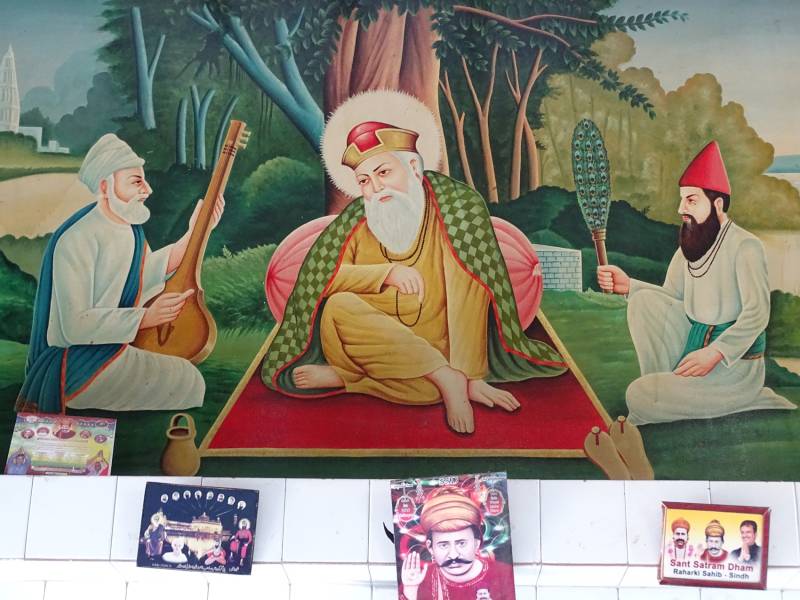
Apart from this, one finds a painting of Bhai Kanaya Lal Bhatio alias Bhai Gurdas, the founder of Khatwari Dharamshala or darbar in Shikarpur, who is shown holding a water bowl and standing before Guru Gobind Singh. A similar painting of Bhai Gurdas holding a water bowl before Guru Gobind Singh can also be seen in other temples and darbars in Shikarpur, the most prominent one at the main Khatwari Darbar in Meena bazaar. Apart from this, one can also see a painting of Bhagat Kanwar Ram. He was born on April 13, 1885, in Mirpur Mathelo’s Jarwar village. Bhagat Kanwar Ram (d 1939) was a famous Sufi singer and poet. He was a disciple of Sant Saeen Satramdas (b 1866 – d 1910).
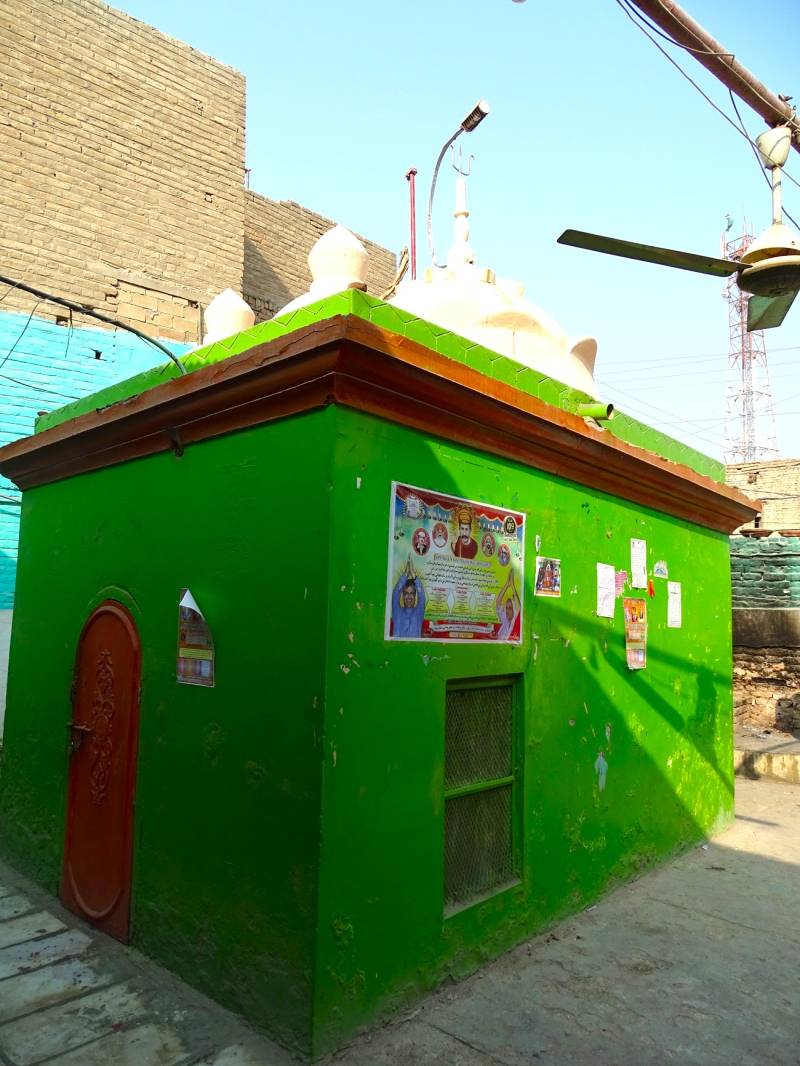
There is also a painting of Jhulelal/Varun Dev who is shown standing on his vahana (that is, his mount), the palla fish. Generally, for Muslim devotees, he is Shaikh Tahir and for Hindus, he is known as Oderolal and Jhulelal. He is variously called Jhulelal Oderolal, Amar Lal, Darya Pir, Darya Shah, Khwaja Khizr, Zinda Pir, and Shaikh Tahir. The main fortified temple complex of Oderolal or Jhulelal is located at Oderolal village in Sanghar’s Tando Adam taluka. The two old temples of Jhulelal in Shikarpur are located in Dhak Bazaar, known as Jugal Piyari Than, and Sajal Sher at Sivi Dar (Sivi Gate) respectively. Both temples have undergone renovations several times. Jugal Piyari Than is now being rebuilt. Jugal piyara Than was also noted for paintings and carved images of Krishna, Jhulelal, and Gadisars (custodians) of the temple, on the wooden door.
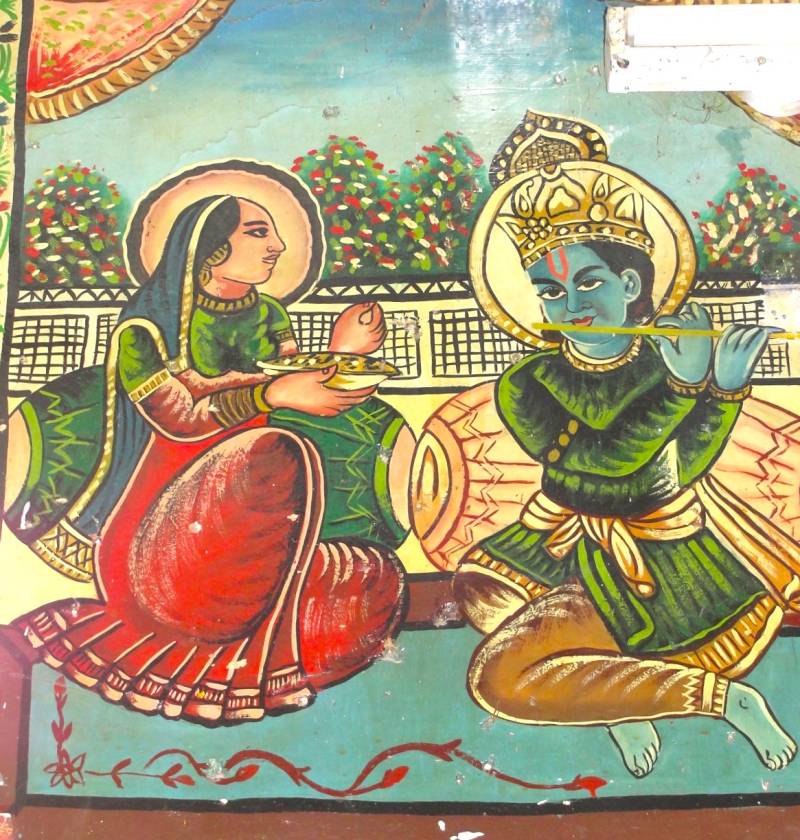
There are four avatars of Vishnu- Matsya (fish), Kurma (tortoise), Rama, and Krishna- painted on the walls of Sant Balakram Ji Marhi.
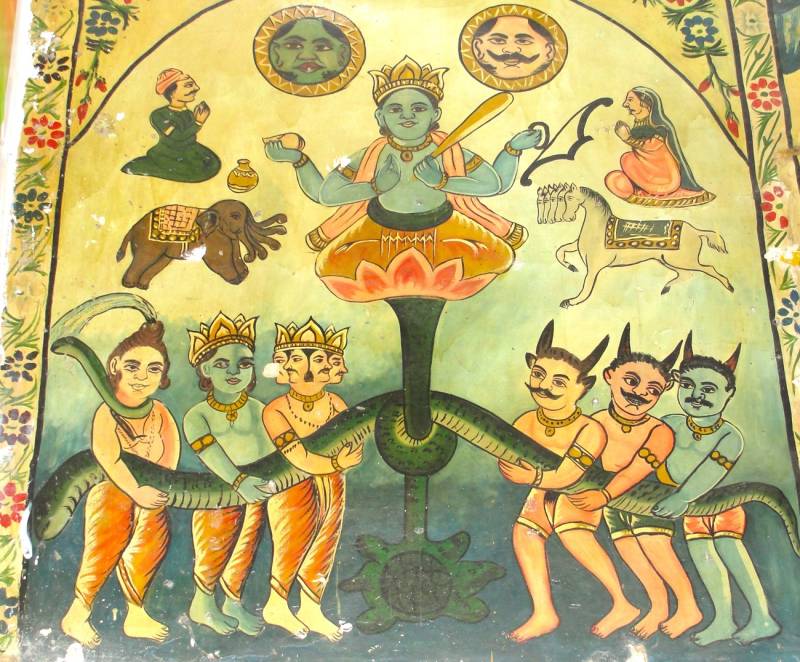
To the left of the painting of Jhulelal is depicted the coronation of Rama (seventh avatar of Vishnu) by Sage Vasishtha. Rama is seated with Sita on the throne under a bejewelled canopy. Rama’s forehead is being anointed with sacred tilak by sage Vasishtha. This scene of the coronation of Rama also shows gods, sages (rishis), and brothers of Rama. On the left, three gods stand behind sage Vasishtha. First in the row stands four-headed Brahma followed by Vishnu and Shiva. The second row depicts the monkey god Hanuman with his allies. Before Hanuman is a figure of another rishi. Below the throne of Rama is shown Ganesha. Behind Rama’s throne stands his brothers Lakshmana, Bharata and Shatrughna.
On the same wall is represented the scene of Samudra Manthana (churning of the ocean of milk). Just opposite to this depiction on the other wall of Marhi is painted Shiva and Parvati. There is also a depiction of Matsya, the Fish avatar of Vishnu, on a wall of the Marhi.
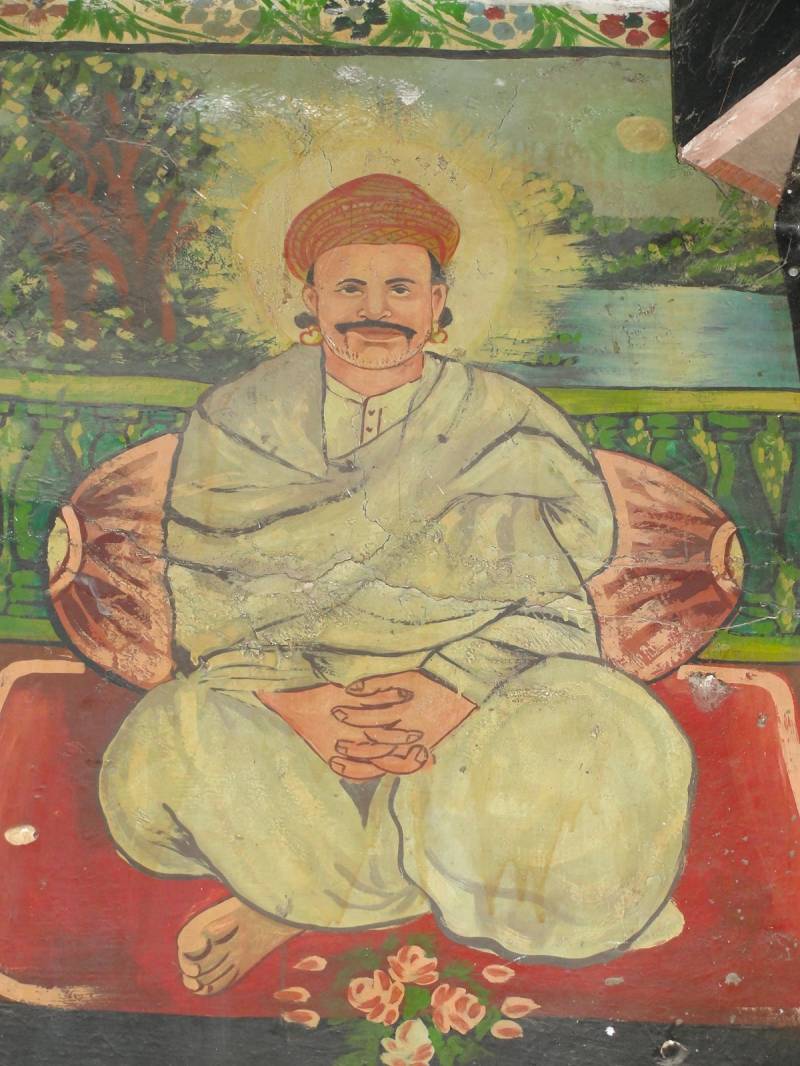
There is also a depiction of Ganesha with his wives Siddhi and Riddi. Krishna and Radha are also painted on one of the walls of Marhi.
Adjacent to Balakram Ji Marhi is located Shivalo where one can see lingam and Nandi. Behind the Balakram Ji Marhi structure is located old Mata Marhi. In the same street also exists the Hanuman temple. In this street are found houses which are noted for beautiful wooden carved brackets.
